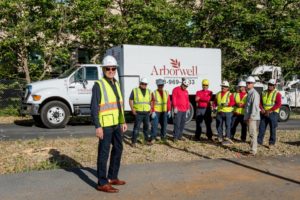Tree Conservation Services That Help Seattle

Arborwell believes comprehensive tree conservation services are essential to protect Seattle’s environment.
Through careful management of trees, Arborwell helps preserve a resource that has an enormous regional and global impact. Many people think tree conservation services apply only to our forests, but Arborwell considers the urban tree populations in cities such as Seattle to be equally important to the ecosystem.
Familiar conifer species such as the Western Hemlock, Western Red Cedar, Ponderosa Pine, and Douglas Fir populate the Seattle landscape. The area is also home to many types of deciduous trees. These include American Sweetgum, London Plane, and varieties of maples and birches.
The most common tree in the Seattle area is the flowery English Midland Hawthorn.
The city’s cool, damp climate is conducive to healthy trees. Yearly rainfall totals average about 37 inches a year, and summertime high temperatures average 75 degrees – ideal conditions for a diverse collection of tree species.
However, tree conservation services in Seattle are a hot topic. City leaders and environmentalists are concerned about the effects of rapid growth on the area’s trees.
Seattle’s Shrinking Tree Canopy
As Seattle Magazine reports, the city’s tree canopy is shrinking due to several factors:
- Climate change. Drought and hot weather weakens trees and makes them more susceptible to disease or damage from storms.
- A lack of wide-scale programs to replace dead trees. As more residents realize the importance of a large, healthy tree population, the push to plant new trees is gaining momentum. Trees for Neighborhoods is among the local groups trying to raise awareness of the benefits of trees in residential areas.
- Large private developments. Mature trees are cut down to make room for large-scale residential and commercial areas. Developers are under no legal obligation to replace the trees removed.
Why Our Tree Conservation Services Are So Important for Seattle and Other Cities
The most persuasive argument for tree conservation services in urban areas such as Seattle is to reduce air pollution. Trees clean the air by taking gases such as nitrogen oxide out of the atmosphere and producing oxygen in return.
A Portland State University study shows trees can reduce the occurrence of respiratory diseases, including asthma in children.
Urban trees also benefit Seattle residents by providing:
- Soil stabilization. In addition to preventing erosion from wind and rain, trees moderate soil temperatures and improve the land’s ability to store water.
- Cooling shade. A house protected by a shady tree uses significantly less energy during summer than a house in direct sunlight. A thick tree canopy also protects people from the sun’s ultra-violet rays.
- Homes for wildlife. Birds, insects and many animals live in trees. Their habitats are essential to keep our ecosystem in balance.
- Spiritual renewal. Evidence indicates that trees and other greenery alleviate depression and stress and promote a feeling of well-being.
Tree Conservation Services Keep Seattle Green
Arborwell offers professional tree conservation services for environmentally aware commercial and public clients in Seattle who want to help their city preserve its trees. Our services include:
Monitoring the overall health of every tree. Our certified arborists identify diseased trees and recommend measures to restore them to full health.
Professional pruning to keep trees strong. Our experts use the correct techniques to trim branches. A skillfully-pruned tree stands a better chance of resisting disease.
Relocating trees. As trees grow, they may pose a hazard to people or buildings. When relocation is warranted, Arborwell gives trees their best chance at survival with expert planting, bracing, watering and fertilization techniques. We try to avoid cutting down healthy trees.
Learn more about Arborwell’s tree conservation services for Seattle and other cities. Our accreditations include those from the Tree Care Industry Association and the International Society of Arboriculture. Call today.
